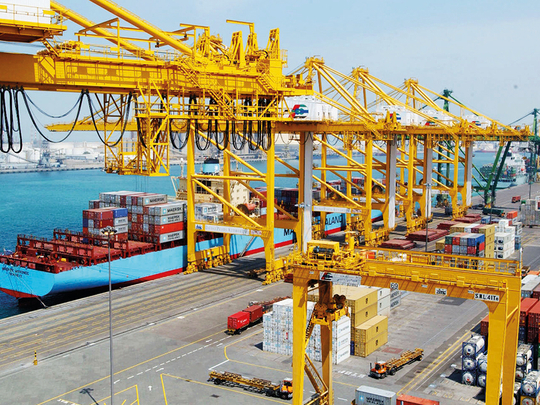
Dubai: Non-oil trade in Dubai rose by 7 per cent year-on-year in the first quarter of 2019 to reach Dh339 billion, according to figures from Dubai Customs.
Exports registered the most growth, rising 30 per cent to reach Dh42 billion while the value of re-exports increased by 7 per cent to Dh106 billion. The value of imports went up by 4 per cent to reach Dh190 billion.
Shaikh Hamdan Bin Mohammad Bin Rashid Al Maktoum, Dubai Crown Prince and Chairman of the Dubai Executive Council, said in a statement that the figures support the emirate’s plans for economic diversification.
30 %
growth in exports, reaching Dh42 billion“This robust performance and marked growth of Dubai’s non-oil foreign trade is an indication that we are on the right path of revenue diversification in alignment with the values and standards outlined in the 50-year Charter,” he said.
During the quarter, Asia was Dubai’s largest trading region, with trade between the two increasing by 7 per cent to Dh208 billion. Trade with Europe, the second largest partner, touched Dh58 billion. Africa witnessed the biggest growth, rising 36 per cent to reach Dh42 billion.
Country-wise, China was Dubai’s biggest trading partner in the first quarter of 2019, followed by India, and the United States. They accounted for Dh36 billion (up 8 per cent year-on-year), Dh33 billion (up 40 per cent), and Dh20 billion (up 10 per cent) respectively to the total trade value in the quarter.
Dh 33 b
trade done with India, second biggest partner this quarterSaudi Arabia was the largest trade partner in the Arab world, with Dh13.2 billion worth of non-oil trade.
Sultan Bin Sulayem, chairman and chief executive officer DP World Group and chairman of the Ports, Customs, and Free Zone Corporation, said the growth in non-oil trade values came despite a “challenging macro and geopolitical environment.”
“Overall, despite geopolitical headwinds, we remain excited about the outlook for Dubai, particularly with the lead-up to Expo 2020,” he said.










